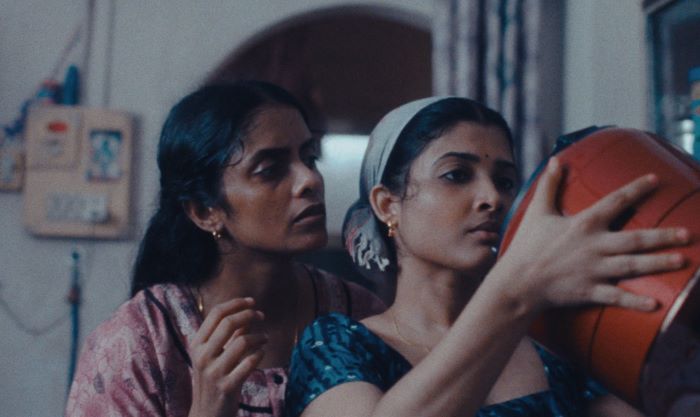![]() An entrancing depiction of life in contemporary Mumbai, All We Imagine as Light falters only in its easy-to-slip-up title. In writer/director Payal Kapadia’s gratifying second film, three women at different stages of life are hobbled by society’s restrictions and inequality, yet they persevere. Camaraderie is the secret to their strength.
An entrancing depiction of life in contemporary Mumbai, All We Imagine as Light falters only in its easy-to-slip-up title. In writer/director Payal Kapadia’s gratifying second film, three women at different stages of life are hobbled by society’s restrictions and inequality, yet they persevere. Camaraderie is the secret to their strength.
Her debut, the documentary A Night of Knowing Nothing (2021), recounts a couple separated due to caste differences during student political protests. In her new fictional tale, she uses real-life footage to set the stage of a bustling urban landscape, such as the early morning hours in a crowded vegetable market. In the city of dreams, villagers come to work but must buy into an illusion of security.
Prabha (Kani Kusruti) is a sari-clad head nurse at a hospital, and her roommate Anu (Divya Prabha) is a recent hire. Prabha’s husband, from an arranged marriage, left her early on to work in a factory in Germany, and now a charming doctor is wooing her. Anu, a Hindu, is in love with Shiaz (Hridhu Haroon), a young Muslim man, and they pursue a taboo romance with secret meetups: She tells her roommate she was “shopping with her cousin.” Their older colleague, widow Parvaty (Chhaya Kadam), has been harassed by property developer thugs trying to oust her from her home. She can’t stay with her son and his family in their small apartment, so her options are limited.
Commuting to the hospital by train in the dark, Prabha’s long work hours include lecturing the young obstetrics staff on placenta disposal. On a walk with her besotted doctor, she listens as he recites a poem to her. “You are like a glowing lamp keeping me warm,” he declares. Meanwhile, rebellious Anu slips birth control pills to a 24-year-old who already has three children and can’t afford contraceptives. Trying to be a guiding force, Prabha warns Anu that no one will respect her if she continues to date her boyfriend after a colleague confronts her with the incendiary gossip about the young woman. When Anu laments that her parents are seeking a husband for her, Prabha confides in her about her ghost of a marriage, telling her, “You can’t escape your fate.” Nevertheless, Anu meets Shiaz at night, and their chemistry is evident. She also buys a veil to rendezvous at his place without raising eyebrows, but the plan is thwarted.
Just under two hours, the delicate Malayalam- and Hindi-language film is enhanced by cinematographer Ranabir Das’s naturalistic camerawork, depicting Mumbai’s heavy traffic, city lights, and skyscrapers that grow taller by the year, or simple moments like Prabha looking out her apartment window as a night train passes by in the distance. The unadorned music of guitar and keyboards from his brother, Dhritiman Das, complements the images. The director’s female gaze, along with brief nudity and frank sexuality, sets this film apart from many of its Indian counterparts.
All We Imagine as Light premiered at this year’s Cannes Film Festival, where it won the Grand Prix and became the first film from India to compete in the main competition in 30 years. A New York Film Festival selection and widely hailed by critics, it was not chosen to represent India in the international feature competition at the 2025 Oscars, as it was deemed too “European.” India’s official submission is Kiran Rao’s Laapataa Ladies.
All We Imagine as Light will be released in U.S. theaters on November 15.

















Leave A Comment